 Today is Human Rights Day. On this day 67 years ago, at the Palais de Chaillot in Paris, the General Assembly of the United Nations adopted what has become the touchstone articulation of humans’ place in our world.
Today is Human Rights Day. On this day 67 years ago, at the Palais de Chaillot in Paris, the General Assembly of the United Nations adopted what has become the touchstone articulation of humans’ place in our world.
We – “All human beings” – proclaims the 1st article of the 1948 Universal Declaration of Human Rights, “are born free and equal in dignity and rights.” All of us “are endowed with reason and conscience,” it continues. It follows, then, that each of us “should act towards one another in a spirit of brotherhood.” In the French version adopted at the same time, that last word is “fraternité,” and hearkens to the French Déclaration, the American Declaration and Bill of Rights, and many others.
Indeed, the document itself benefits from views of sages throughout the world. Gandhi was one who weighed in, thanks to a survey sponsored by UNESCO. The American Law Institute contributed a Statement of Essential Rights. That statement, like the Universal Declaration as a whole, owes much to the Four Freedoms that President Franklin Delano Roosevelt identified in a 1941 speech before Congress.
A half-decade later, that president’s widow, Eleanor Roosevelt, would chair the U.N. committee tasked with drafting the Universal Declaration. Among those joining her in the work were John Humphrey of Canada, Peng Chun Chang of China, Charles Malik of Lebanon, and René Cassin of France. At the time the document was adopted, she declared:
“This declaration may well become the international Magna Carta of all men everywhere.”
It would be easy to look wistfully to that statement, to assume that the world once was better than it seems today. Yet even then, fissures were apparent:
► No state voted against the Universal Declaration, but not every state voted for it, either. Eight of 56 countries abstained: the Soviet Union, the Ukrainian Soviet Socialist Republic, the Byelorussian Soviet Socialist Republic, Yugoslavia, Poland, Saudi Arabia, and South Africa.
► Since 1948, the United Nations has grown to nearly 200 member states. Many of the newcomers once were colonies of states that endorsed the Universal Declaration. Even some of the charter members have undergone profound changes – the China that sent diplomat Chang in 1948 is quite different from the China that now holds the U.N. seat.
► The challenges of sovereign-state diversity and the aims of universal equality – for women as well as men, sisters as well as brothers – change with globalization. The United Nations’ 2015 Sustainable Development Goals represents the body’s latest effort to respond.
► Even the chief proponents hedged their support. By way of example, Roosevelt’s ringing endorsement quoted above occurred in a statement that took pains to stress what the United States did not mean to endorse. In a line that bears echo with later U.S. Supreme Court decisions in DeShaney and Gonzales, she said:
“[M]y government has made it clear in the course of the development of the declaration that it does not consider that the economic and social and cultural rights stated in the declaration imply an obligation on governments to assure the enjoyment of these rights by direct governmental action.”
► Other states turned a colder shoulder toward civil and political rights, signaling that even at its birth, the notion of the indivisibility of rights would prove difficult to sustain and enforce.
Thus today, even as we celebrate another Human Rights Day, we must redouble our efforts to make the promise of the Universal Declaration a reality for everyone who has been born, free and equal, in dignity and rights.
(Photo: IntLawGrrls’ Eleanor, in her new home at our Dean Rusk International Law Center)
Leave a comment